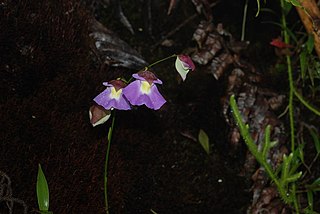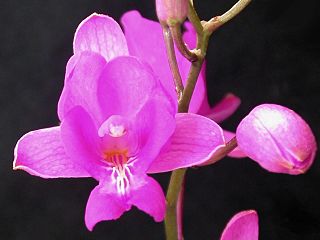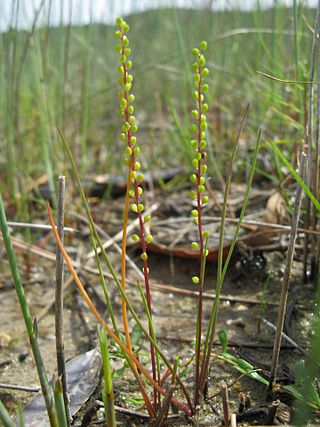
Soliva sessilis is a species of flowering plant in the family Asteraceae. It is one of up to nine species of the genus Soliva and is a low-growing herbaceous annual plant. Its common names include field burrweed, Onehunga-weed, lawn burrweed, lawnweed, jo-jo weed and common soliva. It is one of several plants also known as bindi weed, bindii, or bindi-eye.
Huertea is a genus of plant in family Tapisciaceae. It is native to central and south America. Species include:

Utricularia unifolia is a species of perennial, medium-sized carnivorous plant that belongs to the family Lentibulariaceae. U. unifolia is native to Central America and western South America. It was originally published and described by Hipólito Ruiz López and José Antonio Pavón Jiménez in 1797 and later considered a synonym of Utricularia alpina until Peter Taylor's 1989 monograph on the genus where he restored the species as distinct from U. alpina. It grows as a terrestrial or epiphytic plant on moss-covered trees, rocks, or banks in cloud forests at altitudes between 2,000 m (6,562 ft) and 3,000 m (9,843 ft). U. unifolia usually produces only one leaf, which is where the species epithet "unifolia" is derived from.

Porlieria is a genus of flowering plants in the caltrop family, Zygophyllaceae. Species within this genus are shrubs or small trees of dry subtropical regions. The generic name honours Spanish ambassador Don Antonio Porlier de Baxamar.

Salvia oppositiflora is a species of perennial flowering plant in the famiily Lamiaceae. It is native to Peru, growing at high elevations—7,000 to 12,000 feet. It was collected in 1798 by Hipólito Ruiz López and José Antonio Pavón Jiménez and later described in Flora of Peru.

Anguloa uniflora, commonly known as the swaddled babies orchid, is a species of orchid in the family Orchidaceae. It is the type species of its genus.

Bletia catenulata is a species of orchid in the family Orchidaceae. It is native to Ecuador, Peru, Brazil, Colombia, Bolivia and Paraguay.

Triglochin striata is a species of flowering plant in the family Juncaginaceae. It is native to New Zealand, South America, America, Africa, Australia and Southern Portugal.

Greigia sphacelata is a species of flowering plant in the family Bromeliaceae. This species is endemic to Chile. It is distributed between the Maule and Los Lagos regions. It produces edible fruits, known as 'chupones'.

Pitcairnia paniculata is a species of flowering plant in the family Bromeliaceae. This species is native to Bolivia.

Tillandsia capillaris is a species of flowering plant in the family Bromeliaceae. This species is native to southern and western South America.

Tillandsia purpurea is a species of flowering plant in the family Bromeliaceae. It is endemic to Peru, first described by Ruiz and Pavón in 1802.

Carludovica palmata is a species of flowering plant in the family Cyclanthaceae. It is not a true palm, but its leaves are very similar compared to the leaves of some true palms, for example, to Chelyocarpus ulei. Unlike several true palms, C. palmata does not develop a woody trunk. Its female flowers have large stigmas, and its male flowers have a lot of pollen.
Glinus radiatus is a species of flowering plant in the family Molluginaceae, known by the common name spreading sweetjuice.

Gaiadendron is a genus of parasitic shrubs or trees in the family Loranthaceae. It solely comprises the species Gaiadendron punctatum, which is found in North and South America.

Cavanillesia umbellata is a species of trees in the family Malvaceae. It is native to South America.

Persea caerulea is a species of evergreen tree in the laurel family, Lauraceae. It is native to North and South America.

Fuchsia apetala is a species of small shrub or vine in the family Onagraceae. It is native to Bolivia and Peru.
Fuchsia corymbiflora is a species of shrub in the family Onagraceae. It is endemic to Peru, and was first introduced to the Royal Botanical Gardens, Kew in 1840.

Campomanesia lineatifolia is a species of plant in the family Myrtaceae. Common names include guabiraba and perfume guava.

















